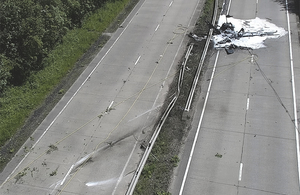Six general licences re-issued for the control of wild birds
Defra has today (18 June) announced that six general licences for the control of wild birds will be reissued on a temporary basis ahead of new licences coming into force on 1 January 2021.
The current licences GL26, GL28, GL31, GL34, GL35 and GL36 will be reissued from 1 August to 31 December. No action is required by licence users, beyond the ongoing requirement to act in accordance with the licence conditions.
Defra announced a longer-term review of general licensing in June 2019 which has made significant progress. The re-issue period is necessary to thoroughly analyse the evidence and to fully develop a general licensing solution for protected sites.
Defra is committed to achieving a general licensing regime for wild birds which is both robust and workable for users, ensuring that longer-term licensing arrangements are informed by the best available evidence. As part of the process, Defra will seek Natural England’s statutory advice.
Defra intends to publish new licences in November to allow user groups to become acquainted with the changes before they officially come into force on 1 January 2021.
Environment Secretary George Eustice said:
It is vital that we have a robust long-term licensing system which balances the needs of users and our wildlife. Our general licencing review has made significant progress, however more time is needed to ensure that we have carefully considered all of the relevant evidence, and to fully develop a general licensing solution for our protected sites.
Our extensive consultation and review process will be completed in the coming months, with the new licences coming into force on 1 January 2021.
The general licences allow users to kill or take certain species of wild birds for a range of purposes such as the protection of livestock and crops, conservation, or public health and safety.
Following a legal challenge by Wild Justice in April 2019, Natural England revoked three general licences and subsequently issued three licences (GL26, GL28 and GL31) to cover some of the species and purposes covered by the original licences that were revoked. Defra subsequently issued three interim licences (GL34, 35 and 36) while the longer term licencing requirements were reviewed. NE’s licences have remained in place, since they allow for specified activity on European protected sites which are not covered by Defra’s licences.
The six general licences are:
- Carrion crows: licence to kill or take them to prevent serious damage to livestock (GL26)
- Canada geese: licence to kill or take them for public health and safety (GL28)
- Woodpigeons: licence to kill or take them to prevent serious damage to crops (GL31)
- Licence to kill or take wild birds to conserve wild birds and to conserve flora and fauna (GL34)
- Licence to kill or take wild birds to preserve public health or public safety (GL35)
- Licence to kill or take wild birds to prevent serious damage to livestock, foodstuffs for livestock, crops, vegetables, fruit, growing timber, fisheries or inland waters (GL36)

